|
 |
His life is a palette
"Communist” Newspaper, N 222 (14701) 23 of September,1982
|
|
I have ingrown my roots
in this land
“Urartu”
newspaper, N 5(60), April 1994
|
|
The legend-man
“Republic of Armenia"
newspaper, N 159 (1919) 25 August 1998
|
|
Thesis
and antithesis of Valentine Podpomogov
“Golos Armenii” N 46 (18401) 29 April 1999 |
|
His
life is a palette
From the studio of an artist
The doors of his studio are always
open, but a question occurs for all the visitors - how do you get in?
It’s not that easy – to go in, without catching the
planks, leaning precariously against the wall and ready to fall on you
any minute, without turning over the buckets, without falling into the
hole in the floor, and finally without stepping on the cat, who bears
the grand sounding name Serapion. The cat follows your strange actions,
yawns, stretches himself and goes into the room. As usual, there are many
people inside, and th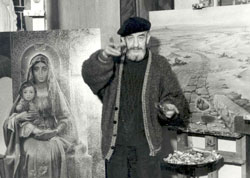 e
host, Valentin Georgievich Podpomogov, is telling one of his endless anecdotes,
which seems to be almost unbelievable. The guests' eyes are wet with tears,
and from time to time a burst of laughter shakes the walls of the studio.
And soon your laughter will be added to this. e
host, Valentin Georgievich Podpomogov, is telling one of his endless anecdotes,
which seems to be almost unbelievable. The guests' eyes are wet with tears,
and from time to time a burst of laughter shakes the walls of the studio.
And soon your laughter will be added to this.
Podpomogov is an artist, but saying that about him is like saying about
an astronaut: “he flies”. Because artists are different, and Podpomogov
contrives to be all at once: designer, film art-director, sculptor, architect,
and finally, painter. And as surprising as it is, all of these despite
the fact that he never obtained any relevant education. Life taught him.
He could write a novel named “My universities”, but he prefers the oral
tradition, and every listener wants to record his stories on tape.
Podpomogov was born in Yerevan in 1924 and has lived there most of his
life. He is a man, who grew up alongside with Yerevan, and as a real patriot
has a right to call the city his. He was the first artist of the city
and did a lot for Yerevan becoming the artist that we know and love now.
He was the first one who “revived” Armenian animated cartoons – he is
the creator of “A drop of honey”, “Parvana”, “The violin in the jungles”.
He created these as he says himself – on a “bare table”.
Now Podpomogov is more famous as a painter; his works are hanged in the
Museum of Contemporary Art. One can find out the impressions about his
art just looking in the visitors' book there.
His paintings are really stunning, with the depth of the thoughts enclosed
in them and the mastery with which it is delivered. The things happening
on in paintings are incredible and sometimes even severe, but they are
so convincing, that you think about them not as a possibility but as a
reality. By the way – that’s the principle concept of Podpomogov in art.
If you ask his opinion concerning what art must be like – he will say:
“convincing”.
“Expectation”. Nobody can stay indifferent to this woman, twisting her
slender fingers, pulling about the bandages on her hands. She doesn’t
have a face. Her expectation is faceless; it is a state, which everyone
knows. Faceless image and speaking hands – a paradoxical combination.
The painting touches the most innermost, the most concealed fibers of
soul in the observer's eyes.
The same is true not only for “Expectance”. All his paintings are paradoxical
and… convincing. It seems that there hasn’t yet been an artist, who co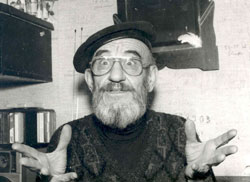 uld
deliver the horrors of war, the tragedy of a whole nation by painting
emptiness. Look at the “Requiem”. An almost empty space, bare earthcovered
with wreckage of stones, a sounding emptiness in the broken bell, and
only a tiny spark of light shimmering from the doors of a temple. A sinister
emptiness. uld
deliver the horrors of war, the tragedy of a whole nation by painting
emptiness. Look at the “Requiem”. An almost empty space, bare earthcovered
with wreckage of stones, a sounding emptiness in the broken bell, and
only a tiny spark of light shimmering from the doors of a temple. A sinister
emptiness.
There are not many of his paintings in the halls of museums, but it is
possible to tell about each of them for a long time, Podpomogov’s paintings
have the ability to stimulate thoughts.
Podpomogov can’t be called a fruitful artist. There are no canvases leaned
on the walls in his studio, no sketches and drafts, covering the floor
and the tables. There is one work on the easel, waiting to be finished
for a long time. And the author himself is busy making with enthusiasm
a palette of incredible construction and is as proud of it as he is with
the best of his paintings: “Leonardo didn’t have a palette like this”.
And nobody doubts that. And the mess is because the studio is under an
endless repair – because the host likes to make everything with his own
hands, inventing new constructions of incredible inventiveness.
-When do you work?
"Always. I am thinking. It is easy to paint a painting, when I totally
imagine it.
….And starts making a kind of chair, which nobody ever had."
Zara
Maloyan
"Communist" Newspaper, N 222 (14701) 23 of September,1982
|
|
I
have ingrown my roots in this land
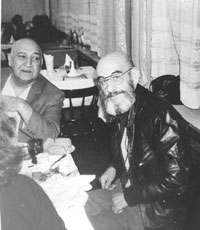 The
Armenian artist Valentin Georgievich Podpomogov will be 70 on 29 of April,
1994. A man of amazing destiny, he is very popular not only in the sphere
of artistic intellectuals. For many years Podpomogov’s jokes and phrases
are on lips of Yerevan. This interview is a kind of vis-à-vis –
allowing us to discover for us the famous master of cinema, brush, design,
to hear his thoughts about himself and time. The
Armenian artist Valentin Georgievich Podpomogov will be 70 on 29 of April,
1994. A man of amazing destiny, he is very popular not only in the sphere
of artistic intellectuals. For many years Podpomogov’s jokes and phrases
are on lips of Yerevan. This interview is a kind of vis-à-vis –
allowing us to discover for us the famous master of cinema, brush, design,
to hear his thoughts about himself and time.
- You are constantly turning to Armenian while speaking...
"My mother is Armenian, and though my father never spoke Armenian,
he understood the language very well -- 'I don't want to mar this gorgeous
language'" he would say. I am a native of Yerevan and when filling
in forms I write – nationality – Russian, mother language – Armenian.
I absolutely adore grabar, though do not understand it at all. I could
be creating my pictures in America or in Switzerland for example. But
that not what I need. I lived and worked in Paris for three months, and
though my mastery of painting was the same, something was wrong, perhaps
the alien ground under my feet.
One confession "I have a kind of crystal dream since childhood –
to create a series of paintings 'Silver suite'. The idea is - birth of
a human, his adolescence, youth, maturity, old age, death and ... birth
again."
"I started to paint to forget the earthly worries about a sunny and
warm place under the sun. Of course, I could be working somewhere abroad,
but there is one thing I understood: I will create this series of paintings
on the land, where I conceived the idea – in my homeland, in Armenia.
I have lived here so many years! I’ll see my seventies in April. My culture
is Russian, but through the prism of Armenia."
- You knew the great artists of this world, didn’t you? You were friends
with Martiros Sarian, with…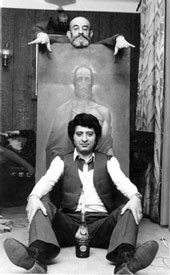
- I adored Sarian! He invited me to work in his studio, I refused the
invitation – “I will not become Sarian, and will loose myself”.
"I knew very well Kojoyan, Galenc, Hrachia Nersisian, Ervand Kochar…
So many unforgettable memories about them, sometimes funny ones. For example
I would always speak to Hrachia in Armenian, and he would always reply
me in Russian – I don’t know why. Imagine how it looked to people!
"Or Ervand Kochar visiting me one day – he came directly from the
scaffoldings of the monument of Vardan Mamikonyan. I was painting then
the picture 'Christ on his knees' (unfortunately it was stolen later).
And Kochar, knelt in front of the picture and said 'Gulo jan (that's how
he called everyone), do not even think that I knelt because you have created
a masterpiece – it's just my feet aching. I can't get up!'"
"I remember an interesting meeting with Papazian in Odessa, where
the film 'Heart of the poet' was being shot. Once, at one in the morning,
he knocked at my door (we had neighboring rooms in the hotel). We were
drinking cognac instead of tea – they have the same color. One bottle,
then the second one!"
Intuitively I always feel the artificiality - the real and the acting.
“I do not envy the kings, I have experienced being one on the stage –
confessed Papazyan – there is only one thing that I am envious of – Hrachia’s
talent”,- and started to sob. Next day during the shooting he didn’t greet
me, and he never did again: he couldn’t forget that he gave himself away
in a moment of weakness.
Paradjanov? He did an honor to me, suggesting to be the art director of
his “Color of Pomegranate” film. And what do you think? I said - no: “Serezha,
I love you too much to be working for you. You’ll be rude with me - and
I hate that. And there won’t be a film in the end”.
He was an extravagant person, I have never seen anyone of his kind in
my life. It was him that I loved truly.
How can I forget Paruyr Sevak with his thick and kind lips? Did you know,
that it was him who translated my name into Armenian - Entaognakanian
(literal 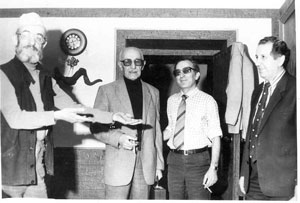 translation
of Podpomogov – “sub-helper”). translation
of Podpomogov – “sub-helper”).
I am not afraid of repeating myself by saying, that everyone must be doing
his job well. I am illiterate, I can't make out my handwriting myself.
I was expelled from the school, and never studied anywhere else. I became
a cartoon maker, because there was nothing else I could do then. But I
do not like cartoons, though made them for half a century. My credo is
– do everything as best you can. Even if do not do anything.
I was painting from early childhood, and I owe for that to one person
– Henrik Igitian. We both loved Her – the Art of Painting.
Yes, talent is a heavenly given gift, but you must work hard on yourself
as well, self education is a great thing. When I was working on my painting
“Mea culpa”, I had to go into thorough study of history of Egypt, culture
of ancient Maya. Creating “The Last Supper” would be almost impossible
without knowing well the Holy Bible. I am a believer, but not pious person.
I don't hide that I loved madly – as an addict – the cinema. But if I
was to start everything from the start – I would go to the theatre. It
is much more interesting, because the painter has to express with very
few means the idea, the spirit of the performance. In cinema the technical
means prevail, but theatre is more of a creative work. What a wonderful
feeling of relaxedness and creative enthusiasm I had when working on stage
production born by the genius of Vardan Adjemian and Hrachia Kaplanian.
-But there is also Podpomogov-sculptor, Podpomogov –designer...Hard to
keep up with the multiple expressions of your talent....
-You are right. This original frame for the painting I made myself (it
is the part of the whole idea), the copper fireplace in my house is also
made by me. The leather hat on my head is again of my own production.
I remember once in post-war Moscow, I had to make a coat for myself...
for the first and the last time 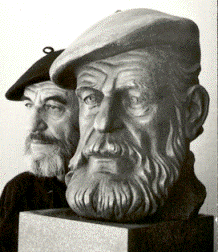 in
my life! in
my life!
I am also an applied-designer. Lamps, doors, fireplaces do not take much
efforts from me to make. It's lucky that I don't know neither physics
nor mathematics, otherwise I would be an aircraft designer too. I say
this without boasting. I really created with my own hands a beautifully
designed compact film developing device, I’ll show it to you when we are
done with the interview – it is under the stairs. I spent a year on it
– learnt metal turning. The main engineer of the cinema studio Eprem Roudman
died – never having believed that I made it myself.
-The artist paints in burst of inspiration, people admire his works, perceiving
them each in the boundaries of their intellect and spiritual quality.
Could you please comment on some of your works.
-Well, look here. This is “Joker” - I associate the hero of the painting
with Gorbachev: he has destroyed everything, not having created anything
new. “Curtain” - it expresses in an allegoric way the attitude to art
(you see the eyes behind the stage) and to marionettes. Though there isn't
any attitude left now.
“Funeral of faith”, “Expectation” - we always are captives of expectations
– from birth till death. And now we live with thoughts – when is all this
absurdity going to end. In short, each work has a whole world in it, the
mood of the artists, his philosophical vision of existence, his urge toward
the perfection of the cosmic spirit. That's what the work “Modern Crucifix”
is about.
Interview
by Ida Karapetian
"Urartu"
newspaper, N5(60), April 1994
|
|
The
Legend-man 
Dear
Maestro, I don't know you at all...
It was strange, it was unexpected – the artist and his paintings didn't
look similar at all, at least from the first sight.
People crossed the threshold of his studio with reverence. People would
go to the artist, expecting to meet a wise, gloomy, taciturn and secluded
person, who managed to find some time, a little window for you out of
his total business. You could see the amazement on their faces, when a
joyful, talkative man would appear in front of them - a master of telling
stories, communicative, with a great sense of humor, sometimes even light-minded.
He had elegant manners. He was an “artist” in the higher sense of the
word. It's hard to find someone who wouldn't like him after meeting him.
There would be a context felt – “you are interesting and important to
me, I don't know you, but you must be a good person. I do not care what
you think of me – but I want to do everything for you to feel good”.
Podpomogov had a unique, rare merit of spiritual generosity. Anyone who
has gone into his orbit would be endowed with merits he could only dream
about. Women would be declared to be beauties, or at least – interesting
women. All the men would become intelligent, brave, and – all as one –
“great specialists”. All the artists would turn into talented and genius.
And we all felt, perhaps for the first time in our life, that we are really
granted with all this merits. 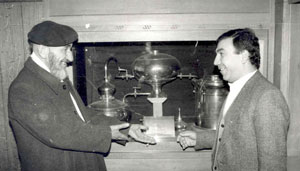 People
would even get overcome with arrogance of their outstanding virtues, but
then would be cured as soon as they understood that these are all his,
Podpomogov's real virtues and he is endowing with them everybody around
him, because he has so many of these, because people are looking at each
other as in a mirror – and see what they are themselves. Nevertheless,
there were some people, who never got cured of this arrogance... People
would even get overcome with arrogance of their outstanding virtues, but
then would be cured as soon as they understood that these are all his,
Podpomogov's real virtues and he is endowing with them everybody around
him, because he has so many of these, because people are looking at each
other as in a mirror – and see what they are themselves. Nevertheless,
there were some people, who never got cured of this arrogance...
He was not a righteous man, neither a saint, and nothing of human life
went past him. He was not an envious person, but couldn’t forget the painful,
hopeless childish envy of children, who had toys, normal food and paints.
He remembered that, and already an old man was trying to satisfy that
childish hunger. Money disappeared as it came – he was buying things in
enormous quantities - 5-10 of each- different instruments, strange screwdrivers
and drills, saws and pliers. Or several cameras – to be shooting from
different angles, and would start to remake, redo them… Bunches of brushes
were scattered as firewood all over the studio - “so that I don’t have
to wash them”. He could find antique things and start making them move
and rotate and slide.
He h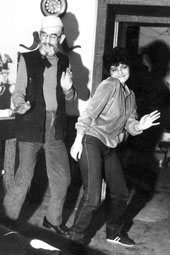 ad
a passion to make something out of nothing. It was equally interesting
for him to create a chair and a painting, and he would spend the same
time, efforts and emotions on both. Then this unique chair could just
be all stained or broken. The painting could be gifted to some passing
acquaintance, though the Maestro knew the price of it quiet well, but
could gift it to anyone – depending on his mood. ad
a passion to make something out of nothing. It was equally interesting
for him to create a chair and a painting, and he would spend the same
time, efforts and emotions on both. Then this unique chair could just
be all stained or broken. The painting could be gifted to some passing
acquaintance, though the Maestro knew the price of it quiet well, but
could gift it to anyone – depending on his mood.
He never kept the sketches and initial
drawings, they were lost, disappeared, or sometimes stolen. He thought
that there was no sense to keep them, though he was a perfect drawer –
and his drawings were no worse than the paintings. If it wasn’t for his
wife, Asya, who managed to save and keep all she could, nothing would
be left now.
People – good and not very good ones, clever and not very clever ones,
sincere and guileful – were coming to him in an endless flow, as if there
was a power attracting them to him.
Levon Igitian said in an interview: “We owe him one, we didn’t manage,
we didn’t think that the time is limited, and we are late now”. It’s not
all true. People managed – many managed to give him their love, to give
him something, anything, bring joy, though many managed to bring pain,
trouble and even treachery.
It is the society and the government that were late. We lack the tradition
to show consideration to people, who are the heroes of national, city
mythology. We don’t have the official status of “national wealth”… So,
I think, the society will be always late to do something for people like
Podpomogov. Their death will always catch people by surprise. And only
after that, after feeling the emptiness from their absence, the society
will try to give them their due. But they will not need it anymore – so
we do it mostly for ourselves.
And different myths and legends have already woven around Podpomogov,
and these we need.
Zara
Maloyan, Arts critic
“Republic of Armenia" newspaper, N159 (1919) 25
August 1998
|
|
Thesis
and antithesis of Valentine Podpomogov,
or Anniversary without Him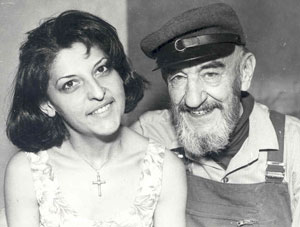
For
Podpomogov’s friends, this day, 29th of April, was one of the most bustling,
unpredictable and cheery holidays during last 7 decades - to be precise
- 74 years.
His wife Asya was dropping from tiredness, relatives-helpers were hindering
each other in the kitchen, the rizenschnautser Harry, kicked out of the
living room because of bad behavior, was barking indignantly.
Guests were coming in an endless flow. As usual, there were not enough
chairs and vases for flowers. Someone was trying to rule over this gathering,
someone was playing an instrument, and someone was drinking. Puffs of
smoke and din were floating over the table.
The harsh faces were watching indulgently from the paintings created by
Podpomogov. Those who have seen Podpomogov's paintings know the solemnly
strict aura, which spreads around them and captures the viewer. The viewer
slows down his tempo, becomes silent, stops smiling, the best mood is
substituted by sorrow, the way that it does when entering a church – it
is a feeling of touching something superior, something that concerns the
earthy life only with one side of it, something that is in other space
and dimension.
I always thought that it is impossible to live, eat, smoke, and watch
TV beside these paintings, as it’s impossible to live in a temple or in
a museum: they are not compatible with everyday routine. Only him, the
creator of these, Valentin Podpomogov could reside in this atmosphere
without any consequences, reigning over his little kingdom. The time had
different pace, space distorted here. His fantasy, which couldn't endure
monotony, manifested itself in his studio, in endless alterations and
repairs of it.
He was a subtle artist feeling the deep tragedy of human existence, called
Maestro even by close people, holding a strange reconciliation of a mischief-maker
and mystifier, ever playing, despite the venerable age and frailties.
Decades, given to cinema and theatre were not lost on him – he transformed
any space he came in. He built decorations in his dwelling, made staging,
where his life was performed as a play. 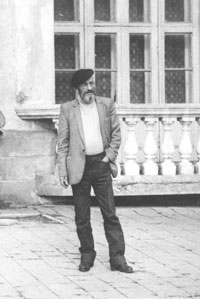 I
tried to count one day the number of levels in his studio, and counted
five of them. "Six, not five" -corrected me Asya, when I expressed
sympathy with her: to lay a table she had to go up and down the stairs.
"He likes these". And there were motherly notes in the intonation
of her speech, which is used to indulge in sprees of her talented child
and be proud of him. I
tried to count one day the number of levels in his studio, and counted
five of them. "Six, not five" -corrected me Asya, when I expressed
sympathy with her: to lay a table she had to go up and down the stairs.
"He likes these". And there were motherly notes in the intonation
of her speech, which is used to indulge in sprees of her talented child
and be proud of him.
Stairs, banisters, caged doors, stained-glass hatches, cellar-bar, unfinished
fireplace, monograms and emblems on the ceiling – he would be half way
through his architectural fantasies when the next ones would capture his
thoughts.
It is not very comfortable to live in a space like this, but he never
led an ordinary, normal life. Everything was constantly changing around
him, the real essence of things and people was revealing. It felt like
falling out of time pace, living in a parallel world, being the real one.
In this purely play space nobody could play –you were confronted with
yourself and were finding out something unexpected about yourself. A well-bred
society member would turn out to be a complete scoundrel, and a person
with a fame of bad morality would perform merits peculiar to children
and saints. The younger people demonstrated proficiency, the older ones
– naivety. Animals behaved like people, but not the opposite...
That’s who Podpomogov was, reconciling in him the painter and the thinker,
the constructor and the workman, the generosity and thrift, gourmandize
and asceticism. Any pair of contradictions is mostly possible to find
in Podpomogov, as if he is a joint spot of thesis and antithesis. Time,
space, people would fall under the influence of his personality, transforming
and polarizing. Everything seemed to transform or even become absolutely
different.
This year he would be 75. He didn’t live to see his round date. That's
somewhat symbolic – he was not a “round” person – he had the tension of
sharp corners in him and eternal strive up to where there is no space
and time equals the eternity.
Zara
Ter-Akopian, Art-critic
“Golos
Armenii” N 46 (18401) 29 April 1999
|
|
Translated by Hehine Koshtoyan
|